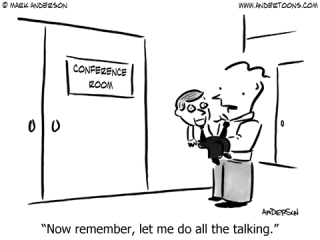 We’ve all made blunders when we’re speaking to prospects about our product or services .
We’ve all made blunders when we’re speaking to prospects about our product or services .
These 7 are the most common sales blunders that are made. I’ll admit that I have made many of these myself, even though I have been teaching this stuff for more than a decade.
1. Letting the Prospect Lead the Sales Process.
Questions are the answer, this is something that I’d learned 30-plus years ago and it is still relevant today. By asking questions we can learn a lot about the people we’re speaking with. [quotesright]We can find out what’s important to them. [/quotesright] But only “IF” we truly listen can we build rapport, trust and respect with them.
The quality of the questions we ask and how we ask them is a developable skill, which increases our effectiveness and demonstrates that we are an expert and a trusted advisor.
2. Not Doing Pre-Meeting Research.
For every minute we invest in research and planning we’ll save 10 minutes in the sales process. I recall hearing Brian Tracy talk about a time that he met with a sales person, and realized the sales person had spent no time or very little at best, just by the questions the rep was asking. The questions that this person was asking Brian were answerable with a few minutes of research on Brian’s website.
In this example the sales rep demonstrated his lack of preparation and Brian’s confidence in the rep and the company was shot. Had the sales rep learned the fundamental information in advance, he would not have wasted Brian’ time. It would have allowed for a deeper understanding and perhaps ended with a sale.
Invest the time to learn about your prospects before you call them and before you try to schedule a meeting. You’ll be in a better space to be able to ask questions that are meaningful; [quotesright]you’ll get to the information that isn’t posted on a website. [/quotesright]
3. Talking Too Much.
Many sales people talk too much during the sales process. They often make declarations about their product, its features, their service and so on. I recall an associate of mine that had just come back from a sales call frustrated with the outcome but believing that if we just told them more that we’d get the order.
[quotes]I challenged him on this approach.[/quotes] I asked him: “So, you are saying that if we just give them more information that something we throw at them will stick on the wall and they’ll engage with us?” He replied, “Yes that’s it.” I suggested that we could “talk and talk” about the virtues and areas where we provide value but we would still fall short of the mark.
I asked him to think about it in a different way. What if we arrange to another time to go back and ask them more questions, questions that would provide a deeper dive into the challenges they are facing and what it would be like if they didn’t have those challenges anymore?
We did arrange a time to meet again and ask more questions and gained a deep understanding of the problems and challenges as the prospect saw them. Based on the new more relevant information, we were able to present a proposal. We would deliver a solution that would meet their requirements of increasing their sales by 30% within a 6 to12-month time frame. The process was longer for sure, but it also positioned us above others in a very competitive situation.
Even though our offering wasn’t the lowest priced, they bought our solution and were able to exceed their original goals.
4. Providing Information That Has No Relevance.
This can easily be avoided. There is a simple process to ensure that the information provided by you in the sales process is relevant. [quotesright]Do the research in advance and ask questions that provide you with the information that you can’t get from any other source. [/quotesright]
Make the most of your presentation by speaking to the conversation that your prospect is having in their head. Speak to them about the problems they don’t want and how you’re able to solve them. Speak in terms of WIIFM – “What’s In It For Me (Them)”. Tie down the benefits your product or service provides that improves their specific situation.
5: Not Being Prepared.
[quotesright]Have you ever made a call to a prospect expecting to receive their voice mail, but low and behold they answered? [/quotesright] If we’re not prepared to talk with the people we’re calling, we can fall into the space where they have control because we end up answering their questions.
Instead of being prepared to ask them a series of qualifying questions to discover if they are a fit for your product or services [quotes]you default to responding to your prospect’s questions, allowing him or her to control the sale. [/quotes] When this happens, unpreparedness has killed a good prospect simply because it did not allow the discussion to progress any further than that initial fumbled call.
Be prepared whenever you make a cold call or attend a meeting with a prospect. Have all the relevant information at your fingertips including pricing, testimonials, samples, and your list of questions that you want to ask. Start by creating a checklist of the key information you will need; review this list before you make your call.
[quotesright]There’s only one opportunity to make a good first impression[/quotesright] and you will not make it if you are not prepared.
6: Neglecting to Ask for The Sale.
As a professional who sells a product or service, you’re obligated to ask the customer for the order, [/quotesright] particularly if you have invested time assessing their needs and know that your product or service will solve a problem.
If you have done the proper groundwork in your sales call, [quotes]you have earned the right to ask them to buy your product or service. This is what all sales professionals do on a regular basis. You will discover if you have earned the right by building rapport, seeking to truly understand their situation and their motivations, problems, fears and opportunity, then asking for a commitment is easy. [quotes]I have often found that they will ask: How do we get started? [/quotes]
7: Failing To Prospect.
[quotesright]This is probably the most common mistake that most sales people make.[/quotesright] When business is good, people stop prospecting; they either simply forget to prospect or think that business will continue as usual.
The reality is that the most successful sales people prospect all the time. They schedule prospecting time in their agenda every week, they treat prospecting as valuable and important as an actual sales call appointment where they are doing a presentation.
The world is not perfect; everyone makes mistakes along the way; even the most seasoned sales professional makes mistakes from time to time. Avoid these blunders and you will greatly increase the likelihood of closing the sale.














